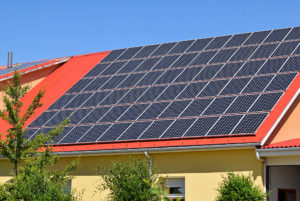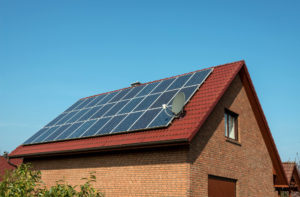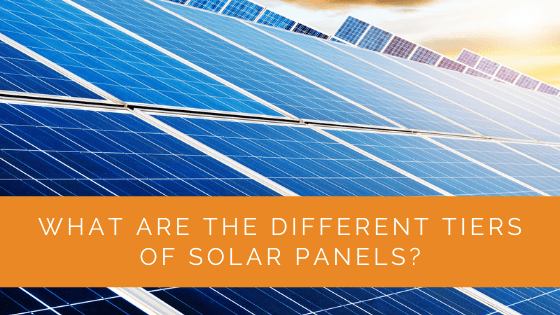Solar energy is one of the best alternatives for non-renewable sources of energy that are depleting at a rapid rate around the world.
With the use of specific devices known as solar panels, solar energy can be effectively converted into other forms of energy, such as electricity, to power both small-scale and large-scale firms. Solar panels have the ability to convert the absorbed light energy from light sources in our solar system, such as the Sun, and convert this energy to produce electricity.
Before you start the process of choosing solar panels for your house, there are several factors that need to be considered. These factors include the shape of your roof, the need for additional structures to support the solar panel, and so on.
Another essential aspect that will help you choose the best solar panel is having an adequate amount of knowledge of the different tiers of solar panels.
Contents
- 1 Key Takeaways
- 2 What is the meaning of a solar panel tier?
- 3 What are tier 1 solar panels?
- 4 What are tier 2 solar panels?
- 5 What are tier 3 solar panels?
- 6 Which tier is the best?
- 7 Case Study: Solar Panel Installation
- 8 Expert Insights From Our Solar Panel Installers About Different Tiers of Solar Panels
- 9 Experience Solar Excellence with Us!
- 10 Conclusion
Key Takeaways
- Solar panels are categorized into different tiers (Tier 1, Tier 2, and Tier 3) based on their manufacturing quality and reliability, with Tier 1 panels being the highest quality and most reliable.
- Tier 1 solar panels are of high quality, tested rigorously, and produced by experienced manufacturers. They offer better efficiency and are considered the best option despite their higher cost.
- Tier 2 panels are less expensive but may have lower efficiency and quality due to newer or smaller manufacturers. Tier 3 panels are produced by companies with minimal experience and are generally of lower quality and reliability.
What is the meaning of a solar panel tier?
Based on the manufacturing process used in producing solar panels in the solar panel industry, the quality of the manufactured solar panel will vary.
The manufacturing process of a solar panel is followed by effective checking and testing processes to confirm the market applicability of the panel. But, if the solar panel manufacturer skips this testing step, the product will be of lower quality.
Based on the solar panel quality, they are differentiated as Tier 1, Tier 2, and Tier 3 solar panels. Each of these tiers has different features. They are primarily used as a way for customers to know the effectiveness of their solar panel purchase.
Let us now dive deep into the properties of each of these different tiers of solar panels:
What are tier 1 solar panels?
In simple terms, tier 1 solar panels are those solar panels that are of high quality. These solar panels are usually elaborately tested by a certified analyst who finally deems these solar panels as tier 1 solar panels.
These solar panels have been produced as a result of quality manufacturing means and hence have a high-efficiency rate. These companies have the experience and means to manufacture solar panels in large quantities. A tier 1 panel is also well equipped with the required temperature coefficient.
This ranking of different solar panel manufacturers is done by Bloomberg New Energy Finance Corporation. The products of tier 1 manufacturers are considered to be of the highest quality in the market.

How can a solar company become tier 1?
Generally, solar companies are considered to produce a tier 1 solar panel if they have been a part of the solar industry for a minimum of five years. If these solar companies have a stable balance sheet, then their efficiency ratings go up, deeming them tier 1 solar panel manufacturers.
Additionally, if these companies are listed in the stock exchange and have a good reputation regarding their financial stability, they are known to be a tier 1 solar company.
Many banks may choose to invest heavily in a solar company if they’ve effectively convinced these banks that their products have undergone a better manufacturing process. These companies also offer a high-performance warranty to customers.
Adhering to the appropriate quality control guidelines is also highly essential. A solar panel mainly uses a photovoltaic cell or solar cells and is hence referred to as a solar PV system.
Solar panel manufacturers who have been declared as producers of tier 1 solar panels will also have higher costs of sale because of factors such as certified product warranty, higher power capacity, and enhanced production facilities.
What are the different types of solar panels under tier 1 solar panels?
There are also different types of solar panels based on the constituent solar cells, such as monocrystalline and polycrystalline panels.
Monocrystalline panels are thin-film panels that contain monocrystalline solar cells. Since these thin-film panels have only a single layer, they provide a larger surface area for electrons to flow, making them highly efficient panels that generate more power.
Unlike thin-film solar panels, a polycrystalline panel has many adjoining layers, reducing their effectiveness in transferring electrons.
Monocrystalline solar panels are a type of thin-film panel that is generally more expensive than polycrystalline solar panels because of their higher efficiency. Tier 1 monocrystalline solar panels range from twenty thousand dollars to about forty thousand dollars, making them one of the most expensive solar panels available.
What are tier 2 solar panels?
Many years ago, the primary producers of solar panels were mainly American and Canadian solar brands with a few European brands. These brands usually had lower warranty claims and provided some of the lowest solar prices.
These types of panels come second in the vertical integration of the ranking of different solar manufacturers. These solar panels may also have some quality issues making them less reliable.
The main reason for this was the lack of adequate knowledge regarding the use of solar panels to power homes and offices. However, many new-age and small-scale solar manufacturers have entered the industry today.
Therefore, these new solar manufacturers were termed tier 2 manufacturers. Unlike larger companies, these companies do not have access to a fully automated production system.
As a result, these solar panels have lower efficiency rates and higher fault risk. These companies also purchase raw materials, such as silicon wafers, thin-film cells, non-crystalline silicon used to make amorphous silicon solar cells, and other silicon fragments from tier 1 manufacturers.
These raw materials are vital for the production of solar panels and for equipping every panel with proper temperature coefficient mechanisms. For example, thin-film solar cells are essential to produce copper indium gallium selenide solar cells and cadmium telluride solar cells.

What are the benefits of tier 2 solar panels?
As tier 2 solar panels are generally lower in cost compared to tier 1, they are good options for those individuals who are looking for affordable solar panels.
These manufacturers usually work from the ground surface and utilize manual production for all their manufacturing processes. Hence, their cost of manufacturing and cost of sale is lower than tier 1 manufacturers.
What are tier 3 solar panels?
Generally speaking, tier 3 solar panel manufacturers are those that have minimal experience in the production of solar panels. These companies offer a lower performance warranty to customers.
These manufacturers will use the products of tier 1 and tier 2 companies to create panels with lower costs. As their brand means are limited, their products are bound to have a quality problem.
Again, these companies have a high degree of liability since they do not have much experience in the solar system field. The quality of the panel produced by these companies can vary based on the manufacturer and where they have obtained their raw materials from.
Which tier is the best?
As we have gone through what each tier means and its features in detail, it can be said without a doubt that tier 1 is the best option for purchasing solar panels.
The various benefits of tier 1 solar panels assist customers in ensuring that they get long-lasting and good-quality solar panels.
While these panels are pretty expensive, you can look at them as an investment that will not require too much maintenance in the future when compared to tier 3 and tier 2 panels.
Case Study: Solar Panel Installation
Background
The Harris family, residing in Des Moines, Iowa, decided to transition to solar energy to reduce their carbon footprint and lower their electricity bills. With an increasing interest in sustainable living, they wanted to understand the different tiers of solar panels to make an informed decision.
Project Planning and Objectives
The Harris family’s objectives were:
- Select the best tier of solar panels for their needs
- Maximize energy production and efficiency
- Take advantage of state and federal incentives for solar energy
- Ensure long-term reliability and minimal maintenance
They contacted Solar Panels Network USA to assess their options and provide a tailored solar solution.
Installation and Costs
After a comprehensive evaluation, a 7kW solar panel system using Tier 1 panels was recommended. The cost breakdown included:
- Tier 1 Solar Panels: $15,000
- Installation: $3,500
- Inverter and Battery: $2,800
- Permits and Inspections: $1,200
- Total Estimated Cost: $22,500
Financial Incentives:
- Federal Tax Credit (ITC): $6,750
- State Rebates: $2,000
- Adjusted Total Cost: $13,750
Installation Process
The installation was completed over four days and included the following steps:
- Site Assessment: Evaluating the roof’s condition, orientation, and shading to determine the best placement for the panels.
- Panel Installation: Mounting 24 high-efficiency Tier 1 solar panels on the south-facing roof to maximize sunlight exposure.
- System Integration: Connecting the panels to a high-efficiency inverter and a battery for energy storage.
- Inspection and Activation: Conducting a final inspection and system activation to ensure optimal performance.
Results and Benefits
The Harris family’s solar power system now generates approximately 850 kWh per month, covering most of their energy needs and significantly reducing their reliance on the grid. The use of Tier 1 panels ensures maximum efficiency and reliability.
Environmental and Financial Impact:
- Annual Savings: $2,000
- Payback Period: ~6.9 years
- Reduced CO2 Emissions: ~3.8 metric tons annually
- Enhanced Energy Independence: The family experiences fewer disruptions and a significant reduction in energy costs.
Summary
The Harris family’s experience in Des Moines, Iowa, showcases the substantial benefits of choosing Tier 1 solar panels. By investing in high-quality, reliable panels, they achieved significant financial savings and reduced their carbon footprint. Solar Panels Network USA’s expertise ensured a smooth installation process, demonstrating the effectiveness of selecting the right tier of solar panels. This project highlights the importance of making informed decisions when investing in solar energy, ensuring long-term efficiency and sustainability for homeowners in Iowa.
Expert Insights From Our Solar Panel Installers About Different Tiers of Solar Panels
Tier 1 solar panels are the gold standard in the industry, known for their high efficiency and reliability. These panels are produced by manufacturers with a strong track record, ensuring customers get the best performance over the lifespan of their solar system.
While Tier 2 solar panels are a more affordable option, they often come from newer manufacturers. These panels can still offer good performance but might not have the same longevity and efficiency as Tier 1 panels.
Choosing Tier 3 solar panels can be risky as they are produced by companies with minimal experience and lower quality control. It’s crucial for consumers to weigh the initial cost savings against potential future maintenance and efficiency issues.
Experience Solar Excellence with Us!
Trust in Solar Panels Network USA, where our seasoned experts deliver top-quality solar solutions for homes and businesses nationwide. With a legacy of countless successful installations and a commitment to sustainable energy, we’re your reliable partner in the solar journey. Ready for a brighter, eco-friendly future? Call us now at (855) 427-0058 and harness the power of the sun!
Conclusion
With depleting fossil fuels and the lack of availability of alternate non-renewable sources of energy around the world, solar power will become a mainstream form of energy in a few years.
Thankfully, our solar system has provided Earth with adequate energy in the form of solar energy that can be used to fuel all our essential day-to-day energy requirements.
About the Author
Solar Panels Network USA stands at the forefront of solar energy solutions, driven by a team of seasoned solar engineers and energy consultants. With over decades of experience in delivering high-quality solar installations and maintenance, we are committed to promoting sustainable energy through customer-centric, tailored solutions. Our articles reflect this commitment, crafted collaboratively by experts to provide accurate, up-to-date insights into solar technology, ensuring our readers are well-informed and empowered in their solar energy decisions.

